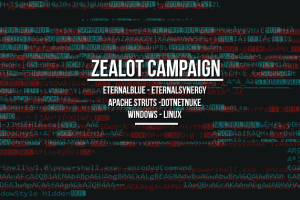"Zealot" campaign uses NSA exploits to mine Monero on Windows and Linux servers
An aggressive and sophisticated malware campaign is currently underway, targeting Linux and Windows servers with an assortment of exploits with the goal of installing malware that mines the Monero cryptocurrency.
 The campaign was detected by security researchers from F5 Networks, who named it Zealot, after zealot.zip, one of the files dropped on targeted servers.
The campaign was detected by security researchers from F5 Networks, who named it Zealot, after zealot.zip, one of the files dropped on targeted servers.
According to Maxim Zavodchik and Liron Segal, two security researchers for F5 Networks, the attackers are scanning the Internet for particular servers and using two exploits, one for Apache Struts (CVE-2017-5638) and one for the DotNetNuke ASP.NET CMS (CVE-2017-9822), to get a foothold on unpatched machines. The Apache Struts vulnerability is the same flaw that other hackers used earlier this year to breach US financial giant Equifax. In addition, a criminal group abused the same flaw in April to target Struts servers where they installed ransomware from which they made over $100,000 at the time.
For this campaign, the Struts flaw included payloads for targeting both Linux and Windows machines at the same time. In the case attackers infected a Windows machine, attackers also deployed EternalBlue and EternalSynergy, two NSA exploits leaked by the Shadow Brokers earlier this year, which attackers use to move laterally in the victim's local network and infect even more systems.
At a later point, they would use PowerShell to download and install the final-stage malware, which, for this campaign, was a Monero miner. On Linux, attackers would use Python scripts that appear to be taken from the EmpireProject post-exploitation framework, and would also install the same Monero miner.
Hackers made at least $8,500 worth of Monero
From the Monero addresses F5 researchers collected, attackers made at least $8,500 from their attacks, but the group could have used more Monero wallets, meaning the total sum could be much higher.
F5 experts also pointed out that attackers could change the final-stage payload to anything they wanted, and the group could switch to installing ransomware in a heartbeat. As a side note, the attackers appear to be big StarCraft fans, as many of the terms and file names used for this campaign are taken from the game, such as Zealot, Observer, Overlord, Raven, and others.
"The level of sophistication we are currently observing in the Zealot campaign is leading us to believe that the campaign was developed and is being run by threat actors several levels above common bot herders," Zavodchik and Segal said, pointing out the use of a multi-stage infection chain, advanced and customized malware, and attention to moving laterally through networks to inflict maximum damage.
Axarhöfði 14,
110 Reykjavik, Iceland














